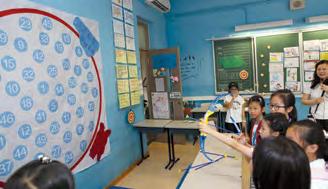8
Providing a supportive environment for interaction We also believe that fun learning activities and games are often effective in motivating learners, especially young ones, to apply the use of a second language. Our department has thus designed a booklet called the English Passport for our students, which provides them with theme-based tasks, supporting materials and organisers for tapping language inputs and exploring ideas on their own. These inputs thus serve as interesting prompts for them to exchange minds and interact verbally with the teachers and English ambassadors on the school campus, offsetting the anxiety often brought by using a second language. The topics for sharing and interaction, revised and updated on a yearly basis, are all closely related to students’ everyday life as well as their perception of the world around them. These face-to-face interactions not only stretch students’ abilities and skills in expressing feelings and thoughts but also develop and expand their vocabulary knowledge. They are also offered the opportunities to apply the language structures and skills learned in the curriculum for a solid foundation. Students who have tried particularly hard in these activities are often awarded gifts for appreciation of their keen efforts.
Interactive activities help build an English school campus
Developing enthusiasm in English It is obvious that learning would only take place when students feel enthusiastic and find meaning for what they are exposed to. Novice students must, in particular, be given enough encouragement and support at the initial stage of learning English. With heightened awareness of the need to make learning experience rewarding and appealing to these freshmen to the school, we have designed two specific learning programmes particularly for them, featuring the English-learning culture of our school.
Creating characters in Primary One English Oral Show The Primary One English Oral Show, often scheduled towards the end of a school year, has been intended as a precious opportunity for elementary students to develop experience in presenting on stage the different materials they have learned in their English oral lessons during the school year. We believe that providing students with engaging tasks to accomplish can no doubt motivate them actively to apply and consolidate the use of English. With a view to arousing novice learners’ interest in speaking English, the English Oral Show is thus regularly scheduled as part of a compulsory programme in the Primary One curriculum. Apart from improving their accuracy and fluency in speaking English, students are given room and autonomy to imagine and create ideas for presenting the characters they act, while reflecting upon message intended in various poems, songs, fun plays and stories. The learning tasks are also intended as learning elements designed for the subject of Project-based Learning.









